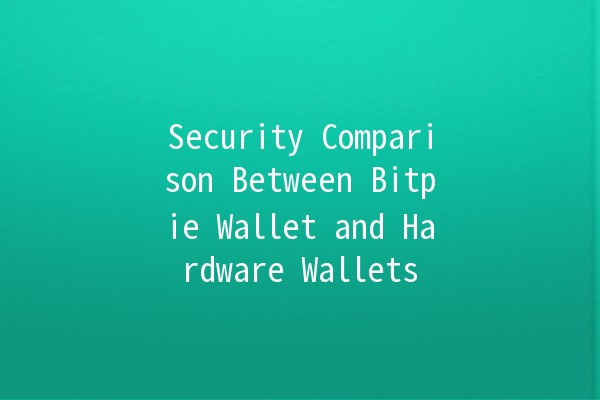




In the rapidly evolving world of cryptocurrency, the importance of secure storage options for digital assets cannot be overstated. With the increasing number of cyber threats, both amateur and professional users are looking for reliable ways to keep their digital currency safe. This article focuses on the security features of the Bitpie Wallet, a popular software wallet, and compares it to traditional hardware wallets, providing insights into their respective strengths and weaknesses.
Bitpie Wallet is a mobile cryptocurrency wallet that allows users to store, transfer, and manage their digital assets efficiently. It is designed to support a variety of cryptocurrencies and is accessible on mobile devices, making it convenient for users who require flexibility. However, being a software wallet, it presents both advantages and challenges regarding security.

Private Key Storage: Bitpie allows users to store their private keys locally on their devices. While this enhances security, it also means that users are responsible for their security practices.
Biometric Authentication: The wallet incorporates biometric features such as fingerprint recognition and facial recognition, adding an extra layer of security against unauthorized access.
Backup Options: Bitpie Wallet provides various backup options, enabling users to save their wallet information safely. Users are encouraged to create backups regularly to prevent data loss.
A hardware wallet is a physical device that securely stores a user's private keys offline. Unlike software wallets, which are connected to the internet and can be vulnerable to hacking, hardware wallets are designed to keep the user's assets safe from online threats.
Cold Storage: Assets are stored offline, protecting them from online threats and malware.
Separate Interfaces: Transactions must be confirmed on the device itself, ensuring that no unauthorized changes can be made via a computer connected to the internet.
Recovery Seeds: Most hardware wallets provide a recovery seed, usually a series of 12 to 24 words, allowing users to recover their wallet if the device is lost or damaged.
To better understand the security implications of using a Bitpie Wallet versus a hardware wallet, let's delve into several critical factors:
Bitpie Wallet: Being a software wallet that operates online, Bitpie is inherently more susceptible to hacking attempts. If a user's device is compromised, an attacker can gain access to the wallet.
Hardware Wallets: With their offline storage capability, hardware wallets are significantly less vulnerable to online attacks. Even if a user's computer gets infected with malware, the wallet’s private keys remain secure.
Bitpie Wallet: Users must be cautious about safeguarding their devices, regularly updating software, and practicing good cybersecurity hygiene. A loss of the device or improper key management could lead to asset loss.
Hardware Wallets: While they do provide enhanced security, users must still ensure physical security and manage their recovery seeds appropriately, as losing access to the physical device can also result in asset loss.
Bitpie Wallet: The convenience of a mobile interface makes transactions easy. However, the tradeoff may involve reduced security.
Hardware Wallets: While they may require more effort to set up and use, the extra steps involved in managing a hardware wallet lead to a more secure storage solution in the long run.
Bitpie Wallet: Provides several backup methods that allow users to secure their assets. However, without careful management, users may lose their wallets due to device failure or loss.
Hardware Wallets: Typically come with a recovery seed for backup, which must be stored securely by the user. This ensures that assets can be recovered if anything happens to the device.
Bitpie Wallet: Free to use, with no initial investment. However, users may face transaction fees and potential losses due to security vulnerabilities.
Hardware Wallets: Typically require an upfront cost, which can range significantly depending on the model. However, they offer a higher level of security, which can justify the investment.
Regardless of which wallet type you choose, implementing specific strategies can help bolster security for your digital assets:
Application: Services like Google Authenticator can be linked to accounts for improved security.
Application: Set reminders to check for updates periodically, keeping software up to date.
Application: Use a password manager to generate and store unique passwords securely.
Application: Make multiple written copies and store them securely in different locations to ensure redundancy.
Application: Regularly read up on cybersecurity best practices to stay informed about potential threats.
The main difference lies in their storage methods. Bitpie Wallet is a software wallet that stores private keys on your device and is vulnerable to online threats. In contrast, hardware wallets store keys offline, significantly reducing the risk of hacking.
Bitpie Wallet has several security features, like private key management and biometric authentication. However, being a software wallet, its safety largely depends on the security practices of the user, such as device protection and backup management.
If you lose access to your Bitpie Wallet, recovery depends on whether you have backed up your private keys or recovery phrases. If these are lost, access to your funds may be permanently lost.
To secure your hardware wallet, keep the device in a safe location, use strong passwords, enable any available features such as PIN codes, and securely store your recovery seed. Regularly check for firmware updates for your wallet.
For longterm storage, a hardware wallet is generally recommended due to its offline security features. Bitpie Wallet is more suitable for frequent transactions and accessibility, but it is riskier for longterm holding.
If you suspect a compromise, immediately transfer your assets to a secure wallet, change your passwords, and ensure your device is clean from malware. Following this, investigate how the breach occurred to prevent future incidents.
By understanding the security measures and implications of using Bitpie Wallet and hardware wallets, users can make informed decisions to protect their digital assets effectively. While no system is entirely immune to threats, practicing good security hygiene and utilizing the right tools can significantly enhance the safety of cryptocurrency investments.